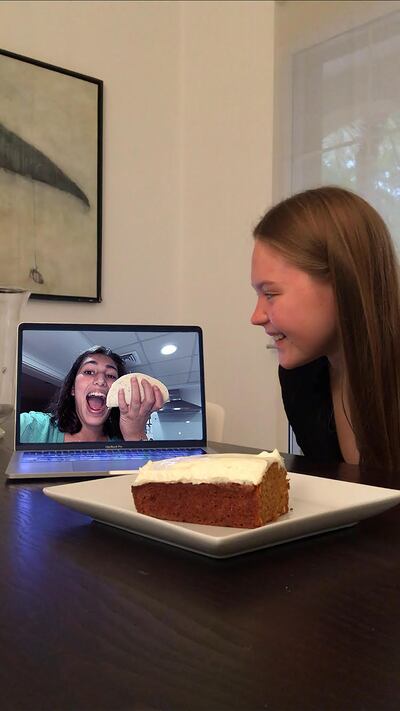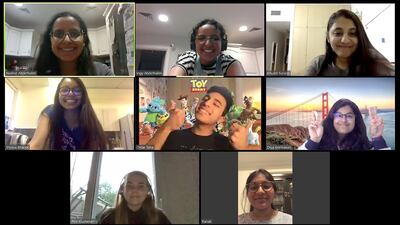As safety measures adopted to combat the spread of Covid-19 continue to keep people apart, a mix of tradition and technology ensures the bonds of friendship and family remain unbroken during Ramadan.
Instead of people gathering around dining tables to break their fast, this year many have settled down in front of laptops or reached for smartphones to enjoy virtual iftars with their loved ones.
A Dubai school took the idea a step further and had its grade 12 pupils cook with their friends with the help of video calls.
Nadine Abdelhalim, 17, of Dubai American Academy, made chocolate truffles, as well as pasta with white sauce, as eight of her friends chatted with her on Zoom.
The group, who usually have a senior breakfast together, are unable to meet in person due to the coronavirus pandemic.
But their school organised a virtual senior iftar to allow classmates to cook together online, with pupils rewarded for the creativity and presentation of their dishes.
“I really enjoyed the experience and though it was virtual it gave a sense of community," Nadine said.
“I made good memories with my friends as we cooked together and then compared our meals.
“By the time we were done cooking there was a sense of normalcy."
The group cooked up tasty treats such as kunafa balls, banana bread, brownies, rice bowls and miso salmon.
“This experience was different for me as I am used to big gatherings in Ramadan,' said Nadine.
“Technology played a massive role because otherwise we would feel a lot more isolated.”
Another pupil, Sofia Ladak, said it was the first time she attended an iftar party, albeit a virtual one.
“My friend and I had dinner together virtually. I made steak tacos and my friend made a carrot cake,” she said.
“I love cooking. Making this meal and enjoying it together was fun.
“I think technology made it possible for us to come together and find a new way of continuing our traditions and making memories.”
Rory Courlander, grade 12 senior adviser at the school, said the class valedictorian was named on Google Meet last week, with about 120 pupils joining the video call for the announcement.

“Education is about contact with people but technology is substituting as best as possible,” Mr Courlander said.
“Everything is different this year so we had to be very creative and organise the senior iftar.
“Friends cooked together and shared this experiences to create a community culture.
“This is a good example of how you can engage pupils and experience something nice.”
Al Manar Centre, a non-profit organisation in Dubai that focuses on Islamic education, plans to hold a virtual iftar for community members, dignitaries and religious leaders in the next two weeks.
“Iftar is a beautiful opportunity to bring people together to build bridges and we did not want to miss out on it this year. We will use technology to host a virtual Iftar,” Ahmed Hamed, a spokesman for the centre, said.
The group plans to send meals to members of the community and people will join a video call and eat together.
Dubai Municipality has also launched an online initiative called Virtual Ramadan Tent to allow employees to come together in the absence of traditional gatherings.
The weekly meetings will feature discussions about various social and cultural issues, such as the effect of physical distancing measures and how each person can protect their families and society during the pandemic.
Employees will also discuss how to motivate people to do good deeds during the holy month and contribute to food drives in the UAE.


